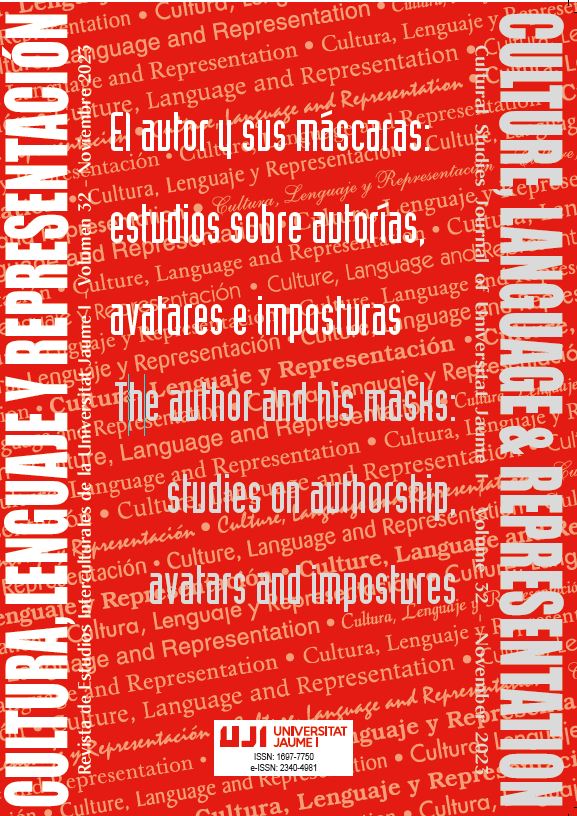Postmemory and autofiction in recent Spanish documentary about the Civil War and Francoism
Main Article Content
Abstract
In recent years the Spanish documentary related to the civil war and the subsequent Franco dictatorship has experienced a verifiable boom. At the same time that interest in the past grew, it was possible to see, in the words of Enzo Traverso, how the "I" burst into the writing of history. These new discursive practices, described by some authors as hybrids between fiction and history, have also been adopted by some Spanish documentary filmmakers belonging, for the most part, to the so-called «post-memory generation». The objective of this essay is to analyze this trend from a theoretical perspective while focusing attention on three especially relevant documentary films: Mi tío Ramón (Ignacio Lasierra, 2015), Canción a una dama en la sombra (Carolina Astudillo Muñoz, 2021) and Apuntes para una herencia (Federico Robles, 2018). We will analyze the use that these products make of that "I" introduced and conceptualized as a problematic element within the writing of history, and that originates from avant-garde products and related to family cinema and found footage, the case of the film by Astudillo, to others closer to the strategies of autofiction, as is the case of the work of Federico Robles.
Downloads
Article Details
An open-access CREATIVE COMMONS copyright license is used. Those authors whose works are published by this journal, accept the following terms:
- Authors will retain their copyright and guarantee the Journal the right to first publish their work, which will simultaneously be subject to the Creative Commons Recognition License CC BY SA that allows third parties to share the work, provided that its author and first publication is indicated.
- Authors may adopt other non-exclusive license agreements for the distribution of the published version of the work (e.g., deposit it in an institutional telematics file or publish it in a monographic volume) provided that the initial publication in this journal is indicated.
- Authors are allowed and recommended to disseminate their work over the Internet (e.g. in institutional telematics files or on their website) before and during the submission process, which can produce interesting exchanges and increase quotes of the published work.
References
Baer, Alejandro. 2005. El testimonio audiovisual. Imagen y memoria del Holocausto. Madrid: CIS.
Bell, Duncan. 2006. «Introduction: Memory, Trauma and World Politics». Memory, Trauma and World Politics. Reflections on the Relationship between Past and Present. New York: Palgrave MacMillan.
Burke, Peter. 2022. La revolución historiográfica francesa. La escuela de los Anales: 1929-1989. Barcelona: Gedisa [1990].
Cadenas Cañón, Isabel. 2019. Poéticas de la ausencia. Formas subversivas de la memoria en la cultura audiovisual contemporánea. Madrid: Cátedra.
Casas, Ana (comp.). 2012. La autoficción. Reflexiones teóricas. Madrid: Arco Libros.
Casas, Ana (ed.). 2014. El yo fabulado. Nuevas aproximaciones críticas a la autoficción. Madrid: Iberoamericana/Vervuert.
Casas, Ana (ed.). 2017. El autor a escena. Intermedialidad y autoficción. Madrid: Iberoamericana/ Vervuert.
Casas, Ana. 2018. «De la novela al cine y el teatro: operatividad teórica de la autoficción». Revista de literatura, enero-junio, volumen LXXX, nº159: 67-87.
Cerdán, Josetxo, y Miguel Fernández Labayen. 2016. «Memoria y documental en la Guerra Civil española y el franquismo. De la memoria patética a la memoria sentimental», revista Pasajes, nº51: 58-73.
Cerdán, Josetxo, y Miguel Fernández Labayen. 2017. «Memoria y fosas comunes: Estrategias políticas del documental independiente», revista L’Atalante, nº23 (enero-junio): 187-198.
Corral, Pedro. 2022. Vecinos de sangre: historias de héroes, villanos y víctimas en el Madrid de la Guerra Civil 1936-1939. Madrid: La Esfera de los Libros.
Egilior, Sabin. 2022. La memoria traumática. Madrid: Dado Ediciones.
Gómez, Agustín y Nekane Parejo. 2020. «Autorretrato, retrato de familia y autoficción en Días de agosto (2005) de Marc Recha», Revista de Comunicación, vol.19, nº1: 109-123.
Gómez, Iván. 2020. «El pasado es una puesta en escena: posmemoria e identidad el documental y la ficción televisiva actual», revista Letral, nº23, enero: 142-167.
Gómez, Iván. 2022. «Autoficciones enfrentadas: La intimidad contra la Historia en el cine español documental actual», revista Pasavento. Revista de estudios hispánicos, 10 (1), 211-233.
Gustrán Loscos, Carmina. Tinieblas. El franquismo en el cine español (1975-2000). Madrid: Marcial Pons.
Herrera Zamudio, Luz Helena. 2007. La autoficción en el cine. Una propuesta de definición basada en el modo analítico de Vincent Colonna. Universidad Autónoma de Madrid. Tesis de doctorado. Disponible en línea: https://repositorio.uam.es/handle/10486/1680
Hirsch, Marianne. 2021. La generación de la posmemoria. Escritura y cultura audiovisual después del Holocausto. Madrid: Carpenoctem [2012].
Kandel, Eric R. 2019. La nueva biología de la mente. Barcelona: Paidós. [2018].
LaCapra, Dominick. 2006. Historia en tránsito. Experiencia, identidad, teoría crítica. Buenos Aires: Fondo de Cultura Económica [2004].
Lobanyi, Jo. 2002. «Introduction: Engaging with Ghosts, or Theorizing Culture in Modern Spain». Constructing Identity in Contemporary Spain: Theoretical Debates and Cultural Practice. Oxford, Oxford University Press: 1-14.
Martin, Jose A. y Rafael Escudero. 2008. Derecho y memoria histórica. Madrid: Trotta.
McNally, Richard J. 2003. Remembering Trauma. Cambridge: Harvard University Press.
Medero, Ana y Soledad Sgarella. 2020. Entrevista «Apuntes para una herencia: reconstruir desde la incomodidad». La Tinta (5 de noviembre). En https://latinta.com.ar/2020/11/apuntes-herencia-reconstruir-desde-incomodidad/.
Nichols, Bill. 1997. La representación de la realidad. Cuestiones y conceptos sobre el documental. Barcelona: Paidós [1991].
Novick, Peter. 1999. The Holocaust in American Life. Boston: Houghton Mifflin.
Piña, Cristina. 2013. «La incidencia de la posmodernidad en las formas actuales de narrar». Cuadernos de CILHA, vol.14, nº2: 16-37.
Quílez Esteve, Laia. 2013. «Memorias protésicas: Posmemoria y cine documental en la España contemporánea». Historia y Comunicación Social. Vol. 18 No Especial Octubre: 387-398.


